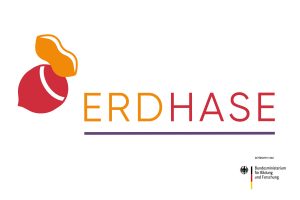A collaborative project launched in spring 2021 and led by R-Biopharm aims to develop tools that detect the potential for allergy triggering in food itself. The project combines clinical, analytical and production know-how to improve the quality of life and safety of allergy patients.
Peanuts and hazelnuts are the most common and dangerous triggers of food allergies. For this reason the seven project partners have chosen these two allergenic foods as examples of how the safety of allergy patients can be improved by the combination of different immunological test systems. The German names for peanut (Erdnuss) and hazelnut (Haselnuss) give the project its name “ErdHase”.
The research project is designed to last three years and is being funded by the German Federal Ministry of Education and Research with around 2 million euros. R-Biopharm is the project coordinator, and Dr. Susanne Siebeneicher is the project manager. We contribute to ErdHase our expertise in the development of test kits for the detection of allergens in food and the characterization of allergy patients. The allergens causing allergy in the patient can be identified with our qLINE® test system – for the classification of allergic patients and the characterization of patients from clinical trials. We are currently preparing a feasibility study for the development of a qLINE® strip for the simultaneous detection of the major allergens from peanut and/or hazelnut from a patient’s serum. In order to select and prioritize samples for the patient studies, a test was also performed by our subsidiary RefLab. There, different roasts of nuts were tested with the serum of selected patients and reactivities were evaluated.
Our project partners are:
- Hochschule Geisenheim University, Institute for Food Safety – Experts in production and analysis of defined processed foods with close contact to food manufacturers. Here, peanuts were roasted by means of various methods commonly used in the industry and with diverse roasting profiles (duration, temperature, and their rise/decline at certain points in the roasting process) – in oil, by drum roasting, and also by infrared roasting (a fairly new method). The peanuts were then sent to industry partners for evaluation, who sensory tested them and classified them into different categories: industrial roast (equivalent to the industry standard) and a higher roast level than industrial roast, but which would still be saleable. The same procedure was performed with the hazelnuts. The nuts were then prepared for the Charité partner in such a way that patients could be and continue to be tested with these samples. In addition, the nuts were examined in protein gels and with ELISA tests. It was found that peanuts from China, Argentina and the USA differ in their protein pattern and also in their recovery in ELISA.
- Hochschule Fresenius (Fresenius University of Applied Sciences ) – Expert in the production and purification of proteins and their analysis purifies proteins from the nuts that are also roasted in Geisenheim to create uniformity in the project. The purified proteins will then be used in the qLINE® strip. In addition, these proteins are also needed for antibody selection at the partner YUMAB.
- Two clinics of the Charité Berlin – Clinic for Dermatology, Venereology and Allergology and Clinic for Pediatrics with a focus on Pneumology and Immunology with Intensive Care Medicine. The first patient studies with the roasted nuts have already taken place here, initial results are still expected.
- German Allergy and Asthma Association – The largest German organization for patients with food allergies has developed a website and created a questionnaire for the food industry. The website is already online and the questionnaire will soon be sent to the industry. Its purpose is to collect a wide variety of industry approaches to the roasting of nuts and their labeling in sensitive products.
- YUMAB GmbH – Experts in the development of recombinant antibodies indicating the patient’s immune response. Isolated genetic information for peanut- and hazelnut-specific antibodies from patient blood (provided by Charité). The purified proteins from the Fresenius University of Applied Sciences are now being used to generate IgG and IgE class antibodies that can be used by R-Biopharm to set up an ELISA test for the detection of peanut or hazelnut in food.
Update in July 2022








